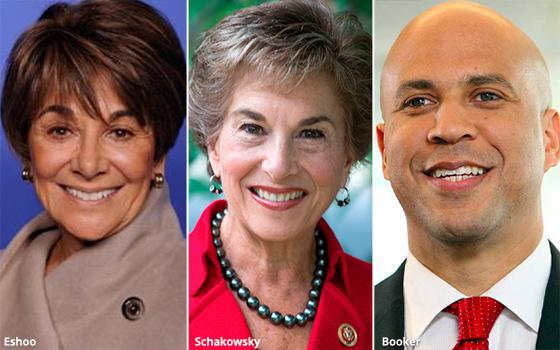
The Interactive Advertising Bureau and
other ad industry groups are urging Congress to reject a bill that would ban most forms of online behavioral targeting.
“Reasonable uses of data should not be demonized, and certainly
should not be banned, based on the unsupported assumptions about advertising practices that, if banned or unreasonably curtailed, would result in the elimination of the commercial internet,”
Lartease Tiffith, executive vice president for public policy at the Interactive Advertising Bureau, said Tuesday in a letter to leaders of the House Energy and Commerce
subcommittee on consumer protection.
The letter came the same day House lawmakers held a hearing on a suite of bills aimed at technology companies, including the “Banning Surveillance Advertising Act,” introduced earlier this year by Reps. Anna Eshoo (D-California), Jan Schakowsky
(D-Illinois) and Senator Cory Booker (D-New Jersey).
advertisement
advertisement
That bill would prohibit ad networks from using personal information, including pseudonymous data, to target ads to consumers.
Schakowsky touted the proposed law at Tuesday's hearing, arguing that targeting people with ads based on
data collected across websites and apps infringes privacy.
“Targeted advertising,” she said, “fundamentally violates users' privacy in a way that would never be accepted if
consumers were actually given the choice."
The proposed law would still allow companies to target ads contextually -- meaning based on the material displayed on the same page as the ad. The
bill would also allow companies to engage in some limited forms of location-targeting, provided the geographic parameters were relatively large -- such as within a state, city, designated market area
or congressional district. The bill additionally would prohibit any targeting based on information (or perceived information) about people's race, national origin, religion, sex, disability and other
protected statuses.
Groups supporting the bill include Accountable Tech, the Center for Digital Democracy and Electronic Privacy Information Center.
The IAB's Tiffith contended in his
letter to lawmakers that targeted advertising benefits businesses as well as consumers.
“Year after year, new media sources, products, and services come online and find the audience and
consumers they seek to serve through data-driven advertising,” he wrote. “Consumers previously had access to only a handful of television and radio stations, one or two newspapers, and the
stores within their community. Today, consumers have access to countless options for where to place their attention and where to obtain the products and services they desire.”
Tiffith
also argued that the proposed law would violate the First Amendment by unreasonably curbing companies' right to engage in commercial speech.
“Categorically banning an entire segment of
advertising would specifically and adversely affect digital publishers that rely on such advertising to support their production and distribution of news, entertainment, opinion journalism, advocacy,
community organizing, and other activities that are fully protected by the First Amendment and centuries of jurisprudence,” he wrote.
The self-regulatory group Network Advertising
Initiative also weighed in Tuesday, stating that the bill would harm businesses that rely on tailored advertising and undermine digital publishers' ability to offer free content.
Two weeks
ago, the Association for National Advertisers offered similar criticisms of the bill.
That organization said in a letter to lawmakers that a ban on behaviorally targeted ads “would
virtually ensure that Americans lose access to the open internet on which they depend to provide them with information, news, products, and services for free or at a very low cost; cripple the economy
and stifle competition; and likely even violate bedrock First Amendment free speech protections.”